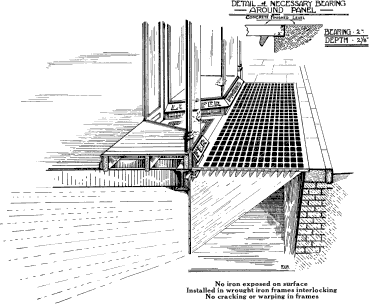Vaulted sidewalk
Vaulted sidewalks, also called sidewalk vaults and areaways are sidewalks that are not placed directly on the ground. Rather, there is an empty space below them where the ground level used to be. This may happen where the street level has been raised over time, or where basements are extended, or as utility vaults.
Sidewalk vaults may be protected as historical architecture, or filling them required for planning permission.[1]
Chicago
[edit]
The raising of Chicago started in 1855[2] as a response to the muddy conditions of the streets [3] and because of epidemics of cholera.[4] The raised streets needed new, raised sidewalks to match them. In the case of vaulted sidewalks, which might be 5 feet (1.5 m) or more over the original street level, a structure was built to hold a new sidewalk at the new street level, and an empty space was left between the original and the new sidewalks. This process gave building owners a choice: raise their buildings to the new street level, or relocate the main entrance to the second floor of the building to match the new street level.[5] Many buildings chose the latter option, opting to use the vaulted area for storage. As recently as 2001 there were still over 2,000 vaulted sidewalks in Chicago[6]
Today the old vaulted sidewalks are visible mostly during construction and cause increased costs of infrastructure maintenance.[7]

Milwaukee
[edit]As of 2022[update], several sidewalk vaults, or "hollow walks," remain in Milwaukee's Historic Third Ward and increase the cost of street and sidewalk reconstruction.[8]
New York
[edit]In New York, basements may extend beneath the sidewalk and drivers are warned "HOLLOW SIDEWALK, DO NOT PARK".[9]
Seattle
[edit]Some Seattle Underground sidewalks have vault lights, inset glass that trasmits sunlight to the lower level.[10]
Use for daylighting
[edit]Prism lighting allows sidewalk vaults to provide daylight to the basement.
-
Two-stage refraction system for basement lighting; prism wall below center, shop above left. Note I-beam and masonry wall.
-
The same system used to light a salesroom inside a hollow sidewalk; prism wall is on the right, vault lights above.
-
A basement daylit by sidewalk prisms (prisms out-of-shot to the left)
References
[edit]
- ^ Marie Wong; et al. (2011), Seattle Prism Light Reconnaissance Study (PDF), Institute for Public Service, Seattle University, archived (PDF) from the original on 27 March 2016
- ^ "City Streets: How Chicago Raised Itself Out of the Mud and Astonished the World Gapers Block: Ask the Librarian". gapersblock.com. Retrieved 2017-06-26.
- ^ Khudeira, Soliman (2009). "Chicago's Vaulted Sidewalks: History and Structural Rehabilitation". Practice Periodical on Structural Design and Construction. 14 (3): 100–104. doi:10.1061/(ASCE)SC.1943-5576.0000032. Retrieved 2017-06-27.
- ^ Nugent, Walter. "Epidemics".
- ^ "Street Grades, Raising". www.encyclopedia.chicagohistory.org. Retrieved 2017-06-26.
- ^ "City Streets: How Chicago Raised Itself Out of the Mud and Astonished the World Gapers Block: Ask the Librarian". gapersblock.com. Retrieved 2017-06-26.
- ^ "Uptown Plaza With Outdoor Concert Stage, Revamped Broadway In The Works". DNAinfo Chicago. Archived from the original on 2017-09-07. Retrieved 2017-06-26.
- ^ Jannene, Jeramey (April 7, 2022). "Transportation: Traffic Calming Efforts Advancing On Two Downtown Arteries". Urban Milwaukee.
- ^ Denton, Jack (29 October 2020). "Your Latest Nightmare: How Does a Sidewalk Just Collapse and Swallow a Guy Up?". Curbed. Retrieved 30 October 2020.
- ^ Dever, Jim (14 June 2017). "The historic glass streets of Pioneer Square are nothing short of amazing". KING 5. KING-TV. Retrieved 9 November 2021.



